选修模块7 Unit 19 Language Lesson 2 Varieties of English 课件(35张)
文档属性
| 名称 | 选修模块7 Unit 19 Language Lesson 2 Varieties of English 课件(35张) |

|
|
| 格式 | zip | ||
| 文件大小 | 1.0MB | ||
| 资源类型 | 教案 | ||
| 版本资源 | 北师大版 | ||
| 科目 | 英语 | ||
| 更新时间 | 2019-07-12 00:00:00 | ||
图片预览

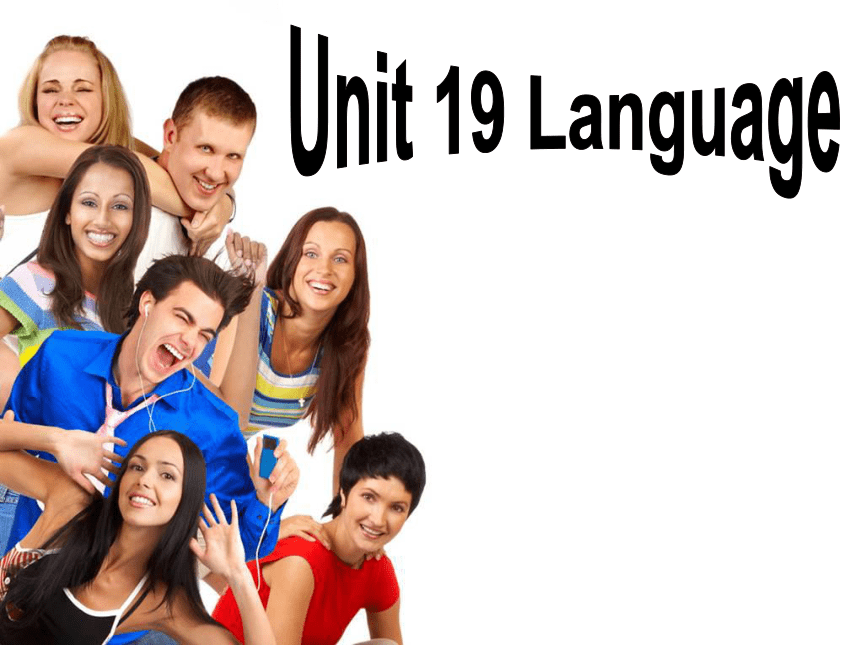
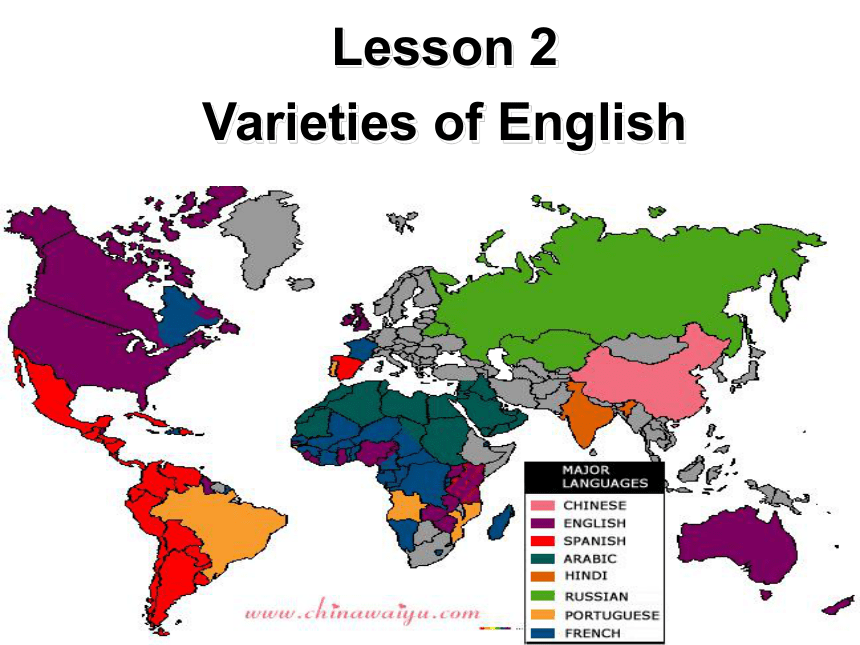
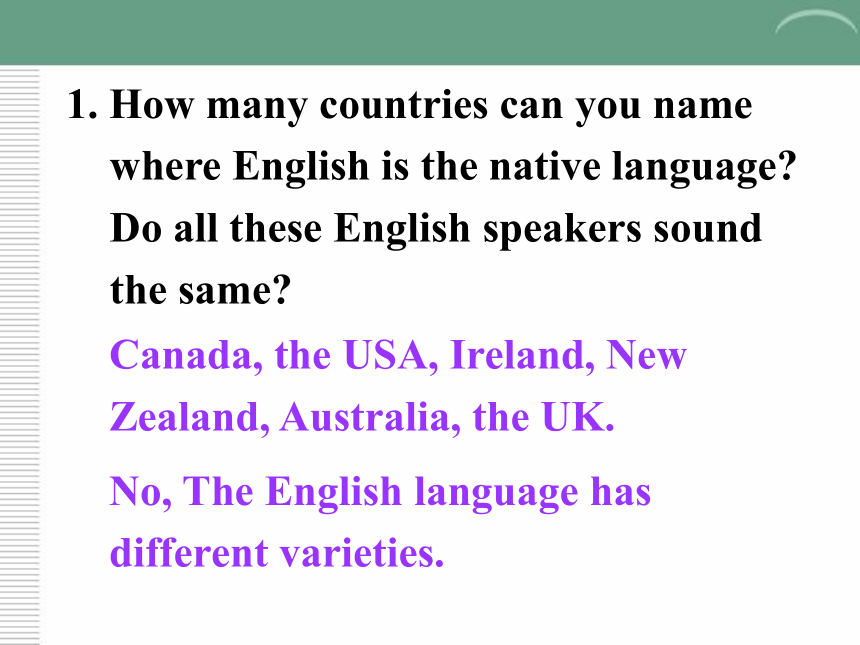
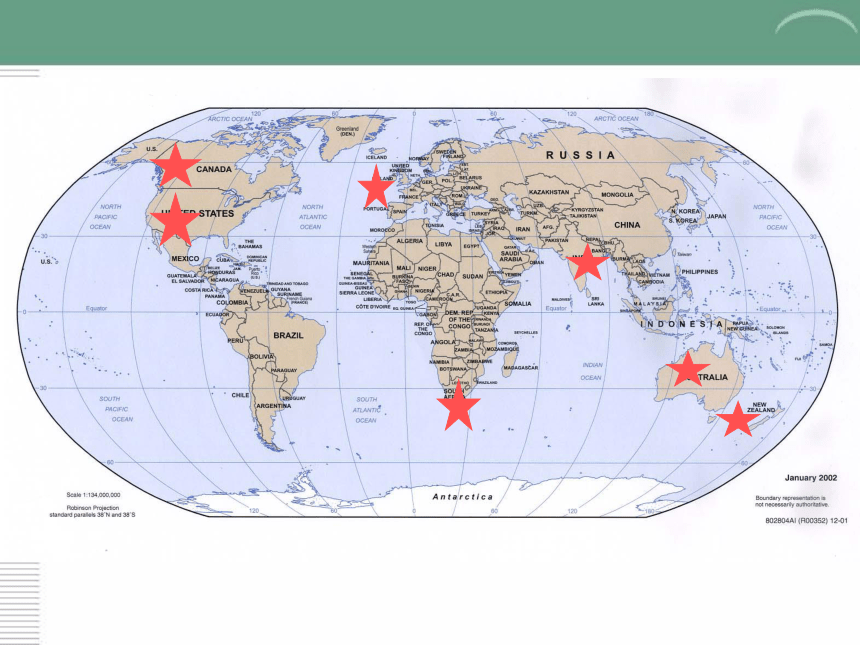
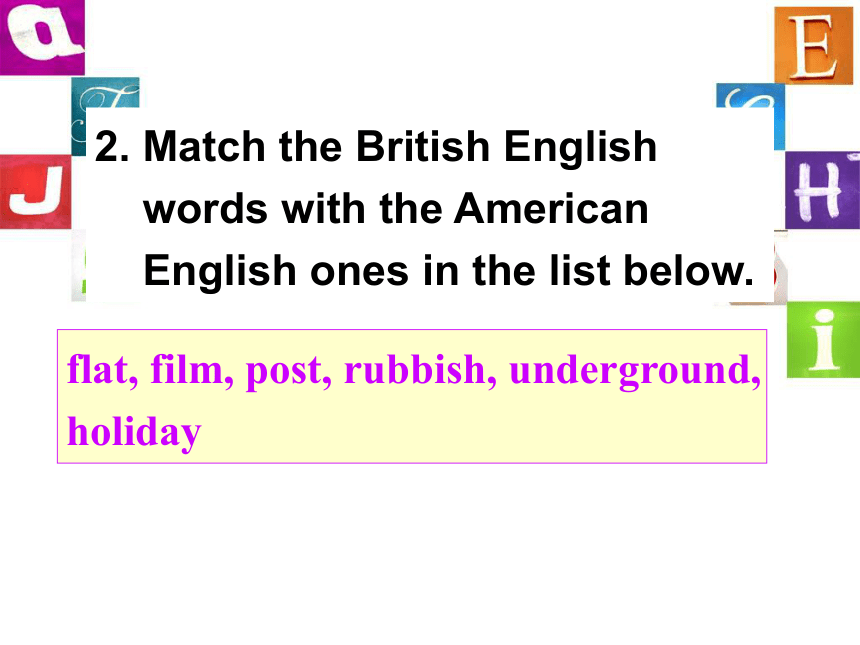
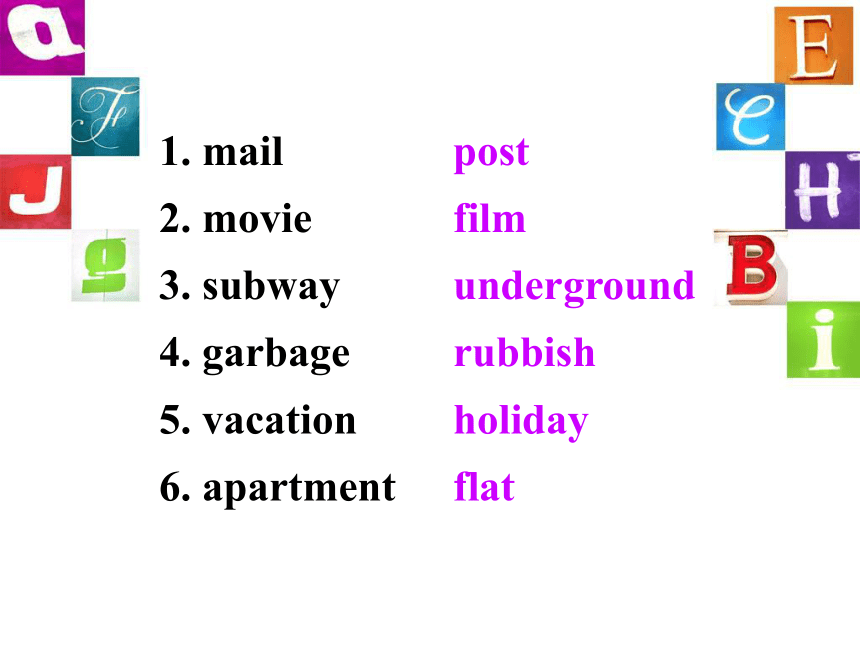
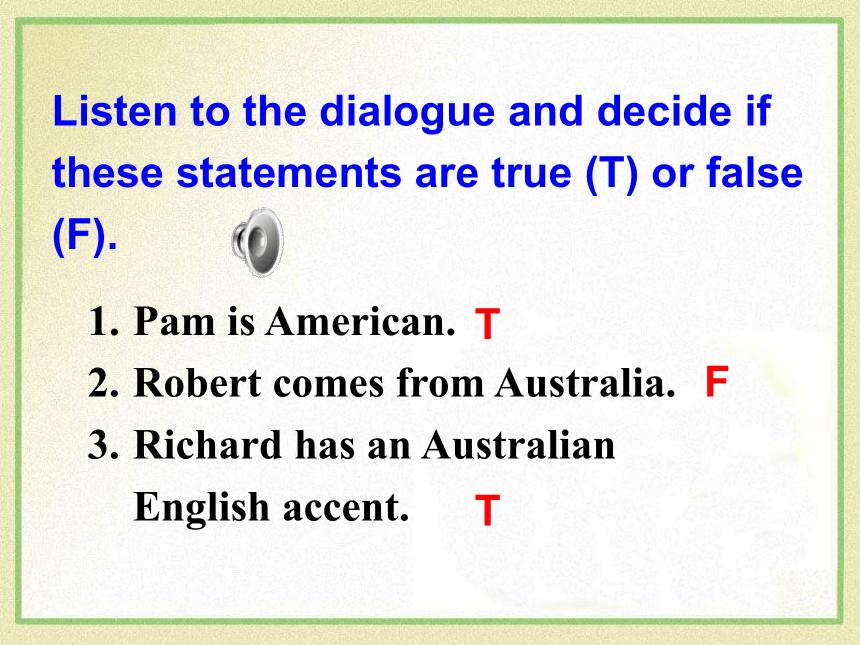
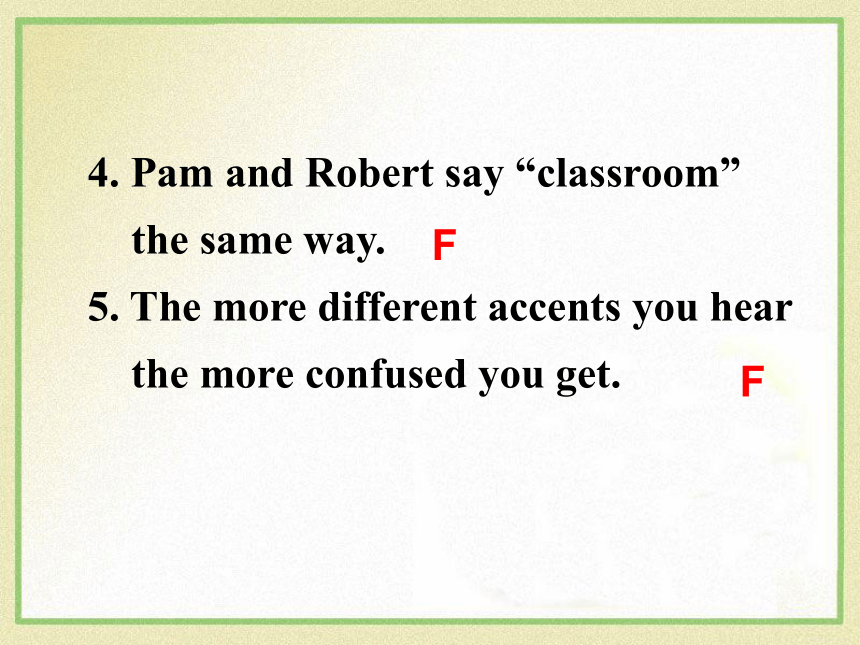

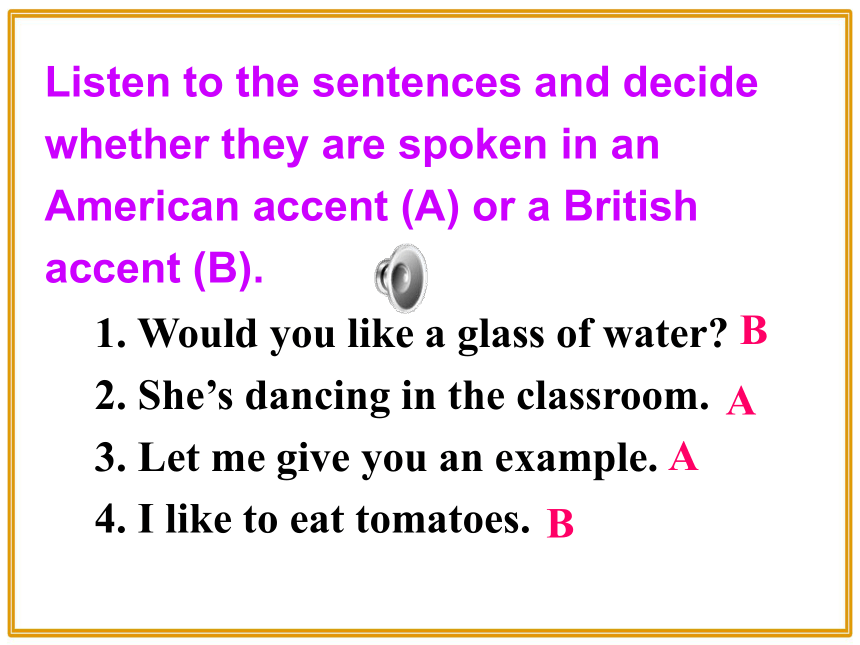
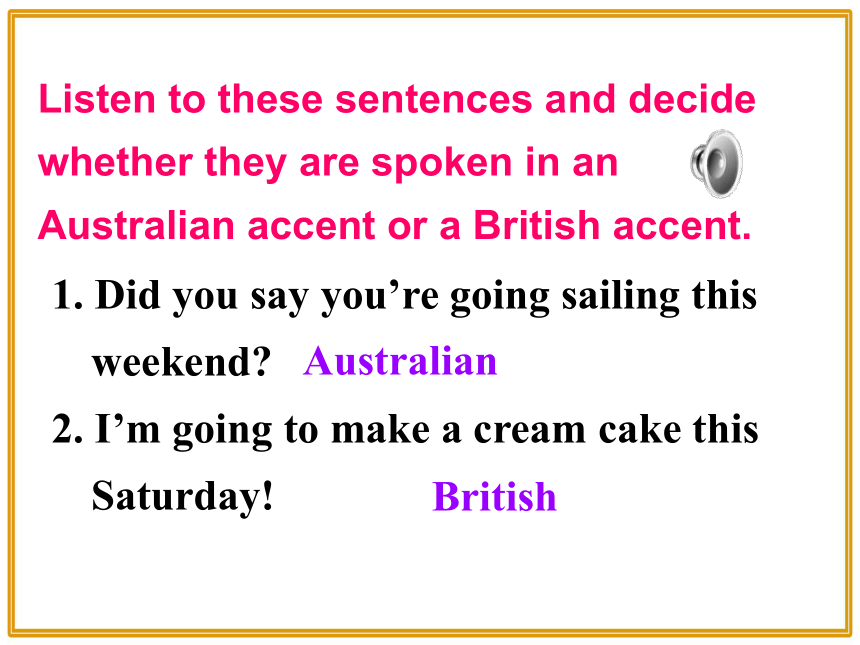
文档简介
课件35张PPT。北师大 高二
Unit 19Unit 19 Language
Lesson 2
Varieties of English 1. How many countries can you name where English is the native language? Do all these English speakers sound the same?Canada, the USA, Ireland, New Zealand, Australia, the UK.No, The English language has different varieties.2. Match the British English
words with the American
English ones in the list below.flat, film, post, rubbish, underground, holiday mail
movie
subway
garbage
vacation
6. apartmentpost
film
underground
rubbish
holiday
flatPam is American.
Robert comes from Australia.
Richard has an Australian English accent. Listen to the dialogue and decide if these statements are true (T) or false (F).TFTFF4. Pam and Robert say “classroom” the same way.
5. The more different accents you hear the more confused you get.Why do you think Liang Weimin thought all English speakers sounded like BBC World Service reports?He probably learns English by listening to BBC World Service broadcasting and has never heard any other English accents.Listen to the sentences and decide whether they are spoken in an American accent (A) or a British accent (B).1. Would you like a glass of water?
2. She’s dancing in the classroom.
3. Let me give you an example.
4. I like to eat tomatoes.BAABListen to these sentences and decide whether they are spoken in an Australian accent or a British accent.1. Did you say you’re going sailing this weekend?
2. I’m going to make a cream cake this Saturday!AustralianBritish3. How much did you pay for the razor?
4. The mail always comes on Tuesdays.
5. What did you say when he was late?
6. Sorry I’m late. I had to pay my bills.AustralianAustralianBritish BritishListen to the conversation and decide which speaker is American, which is British and which is Australian.AmericanAustralianBritishListen to the Canadian travel dialogues and choose the correct alternative for each dialogue.1. Where are the people?
a) in a tourist information office
b) in a hotel
c) at the office
d) on a train2. What does the woman want?
a) information about some modern
buildings in Toronto
b) information about some old
buildings in Toronto
c) a tour of the city
d) a brochure on Toronto3. What are they talking about?
a) a tour around the city
b) a delay
c) stopping off somewhere
d) the city’s buildingsListen again and use these expressions to complete the Function File.
Would it be possible, Could you, I’m sorry but, I was wondering if, Do you think I could, Will you be, I’d prefer not, I’m afraid, Is it all right if, If you’d like, Could you possibly, I wonder if1. ___________ to fill in this form here, please.
2. I know this is unusual, but after the long flight ____________ to go on with the group.
3. _____________ I just go off on my own a bit later?If you’d likeI’d prefer notIs it all right ifPolite Requests4. _________ she won’t be here till about ten o’clock.
5. __________ having lunch in the hotel, sir?
6. _________________ give me a map of the city, please?Will you beCould you possiblyI’m afraid7. ________________ you could give me information about visits to some of the buildings in Toronto, please?
8. __________________ have something about the modern buildings, please?I was wondering ifDo you think I could9. _________ ask someone else, please?
10. __________ I could ask you something?
11. _________________ to stay over an extra night in New York?
12. ____________ we have to keep to the timetable, sir.Could youI wonder ifWould it be possibleI’m sorry butPronunciation. Listen and think about language and intonation. Which requests are: polite and indirect?
too direct and possibly rude?1.
2.
I want a seat by the window.Could you possibly give me a seat by the window?b)a)3.
4.
5.
6.
Is it all right if I pay by credit card?I’ll pay by credit card.a)b)If you’d like to wait a moment, please.Could you just wait a moment, please?a)a)Help me with my bags, will you?I was wondering if you could help me with my bags.7.
8.a)b)Now listen and repeat six polite requests.1. Could you possibly give me a hand with my bags, please?
2. Is it all right if I leave my bags here?
3. I was wondering if I could have breakfast earlier?4. Could you tell me where the restaurant is, please?
5. Do you think I could have a menu, please?
6. I wonder if I could have another egg, please?Act out a dialogueStudent A—a tourist who is checking in a hotel, makes some requests at the front desk.
Student B—a receptionist of the hotel, refuses some of the requests politely.You are checking into a hotel. Prepare to ask for these things politely.
a double room on the first floor
a wake-up call at 7:30
a full English breakfast in your room at
8:15
a map of the city
a taxi at 9:00 Sample dialogueSB: Good afternoon, sir. Welcome to
our hotel. May I help you? SA: Good afternoon! I’d like to have a
room at your hotel for my holiday.
SB: Which kind of room would you
prefer?
SA: Could you arrange a double room
on the first floor for me? SB: Wait a moment, please...Oh, Room
1111 is available.
SA: I am wondering if I could have a
wake-up call at 7:30?
SB: Of course, sir. Every morning we
make a call to all the rooms at that
time to give a wake-up call.
SA: Could I a full English breakfast in
my room at 8:15?SB: Sorry, sir. I’m afraid we don’t have
it. You could have your breakfast
at our dining hall on the first floor.
SA: Could you provide me a map of the
city?
SB: Here you are.
SA: Could you help me to call a taxi at
9:00?SB: Sorry, sir. Here is far away from
the center of the city, so it is not
easy to call a taxi in the morning.
But we have a minibus for all the
guests to go to the center.
SA: Ok. I’ll take it. Thank you.
SB: It’s my pleasure. We hope you have
enjoyed your stay. You are checking into a hotel. Prepare to ask for these things politely.
a room with a bathroom
a table for twelve in the hotel restaurant
at 8:30
some stamps for postcards
a morning newspaper with your breakfast
information about museumsThis is for you!
Unit 19Unit 19 Language
Lesson 2
Varieties of English 1. How many countries can you name where English is the native language? Do all these English speakers sound the same?Canada, the USA, Ireland, New Zealand, Australia, the UK.No, The English language has different varieties.2. Match the British English
words with the American
English ones in the list below.flat, film, post, rubbish, underground, holiday mail
movie
subway
garbage
vacation
6. apartmentpost
film
underground
rubbish
holiday
flatPam is American.
Robert comes from Australia.
Richard has an Australian English accent. Listen to the dialogue and decide if these statements are true (T) or false (F).TFTFF4. Pam and Robert say “classroom” the same way.
5. The more different accents you hear the more confused you get.Why do you think Liang Weimin thought all English speakers sounded like BBC World Service reports?He probably learns English by listening to BBC World Service broadcasting and has never heard any other English accents.Listen to the sentences and decide whether they are spoken in an American accent (A) or a British accent (B).1. Would you like a glass of water?
2. She’s dancing in the classroom.
3. Let me give you an example.
4. I like to eat tomatoes.BAABListen to these sentences and decide whether they are spoken in an Australian accent or a British accent.1. Did you say you’re going sailing this weekend?
2. I’m going to make a cream cake this Saturday!AustralianBritish3. How much did you pay for the razor?
4. The mail always comes on Tuesdays.
5. What did you say when he was late?
6. Sorry I’m late. I had to pay my bills.AustralianAustralianBritish BritishListen to the conversation and decide which speaker is American, which is British and which is Australian.AmericanAustralianBritishListen to the Canadian travel dialogues and choose the correct alternative for each dialogue.1. Where are the people?
a) in a tourist information office
b) in a hotel
c) at the office
d) on a train2. What does the woman want?
a) information about some modern
buildings in Toronto
b) information about some old
buildings in Toronto
c) a tour of the city
d) a brochure on Toronto3. What are they talking about?
a) a tour around the city
b) a delay
c) stopping off somewhere
d) the city’s buildingsListen again and use these expressions to complete the Function File.
Would it be possible, Could you, I’m sorry but, I was wondering if, Do you think I could, Will you be, I’d prefer not, I’m afraid, Is it all right if, If you’d like, Could you possibly, I wonder if1. ___________ to fill in this form here, please.
2. I know this is unusual, but after the long flight ____________ to go on with the group.
3. _____________ I just go off on my own a bit later?If you’d likeI’d prefer notIs it all right ifPolite Requests4. _________ she won’t be here till about ten o’clock.
5. __________ having lunch in the hotel, sir?
6. _________________ give me a map of the city, please?Will you beCould you possiblyI’m afraid7. ________________ you could give me information about visits to some of the buildings in Toronto, please?
8. __________________ have something about the modern buildings, please?I was wondering ifDo you think I could9. _________ ask someone else, please?
10. __________ I could ask you something?
11. _________________ to stay over an extra night in New York?
12. ____________ we have to keep to the timetable, sir.Could youI wonder ifWould it be possibleI’m sorry butPronunciation. Listen and think about language and intonation. Which requests are: polite and indirect?
too direct and possibly rude?1.
2.
I want a seat by the window.Could you possibly give me a seat by the window?b)a)3.
4.
5.
6.
Is it all right if I pay by credit card?I’ll pay by credit card.a)b)If you’d like to wait a moment, please.Could you just wait a moment, please?a)a)Help me with my bags, will you?I was wondering if you could help me with my bags.7.
8.a)b)Now listen and repeat six polite requests.1. Could you possibly give me a hand with my bags, please?
2. Is it all right if I leave my bags here?
3. I was wondering if I could have breakfast earlier?4. Could you tell me where the restaurant is, please?
5. Do you think I could have a menu, please?
6. I wonder if I could have another egg, please?Act out a dialogueStudent A—a tourist who is checking in a hotel, makes some requests at the front desk.
Student B—a receptionist of the hotel, refuses some of the requests politely.You are checking into a hotel. Prepare to ask for these things politely.
a double room on the first floor
a wake-up call at 7:30
a full English breakfast in your room at
8:15
a map of the city
a taxi at 9:00 Sample dialogueSB: Good afternoon, sir. Welcome to
our hotel. May I help you? SA: Good afternoon! I’d like to have a
room at your hotel for my holiday.
SB: Which kind of room would you
prefer?
SA: Could you arrange a double room
on the first floor for me? SB: Wait a moment, please...Oh, Room
1111 is available.
SA: I am wondering if I could have a
wake-up call at 7:30?
SB: Of course, sir. Every morning we
make a call to all the rooms at that
time to give a wake-up call.
SA: Could I a full English breakfast in
my room at 8:15?SB: Sorry, sir. I’m afraid we don’t have
it. You could have your breakfast
at our dining hall on the first floor.
SA: Could you provide me a map of the
city?
SB: Here you are.
SA: Could you help me to call a taxi at
9:00?SB: Sorry, sir. Here is far away from
the center of the city, so it is not
easy to call a taxi in the morning.
But we have a minibus for all the
guests to go to the center.
SA: Ok. I’ll take it. Thank you.
SB: It’s my pleasure. We hope you have
enjoyed your stay. You are checking into a hotel. Prepare to ask for these things politely.
a room with a bathroom
a table for twelve in the hotel restaurant
at 8:30
some stamps for postcards
a morning newspaper with your breakfast
information about museumsThis is for you!
